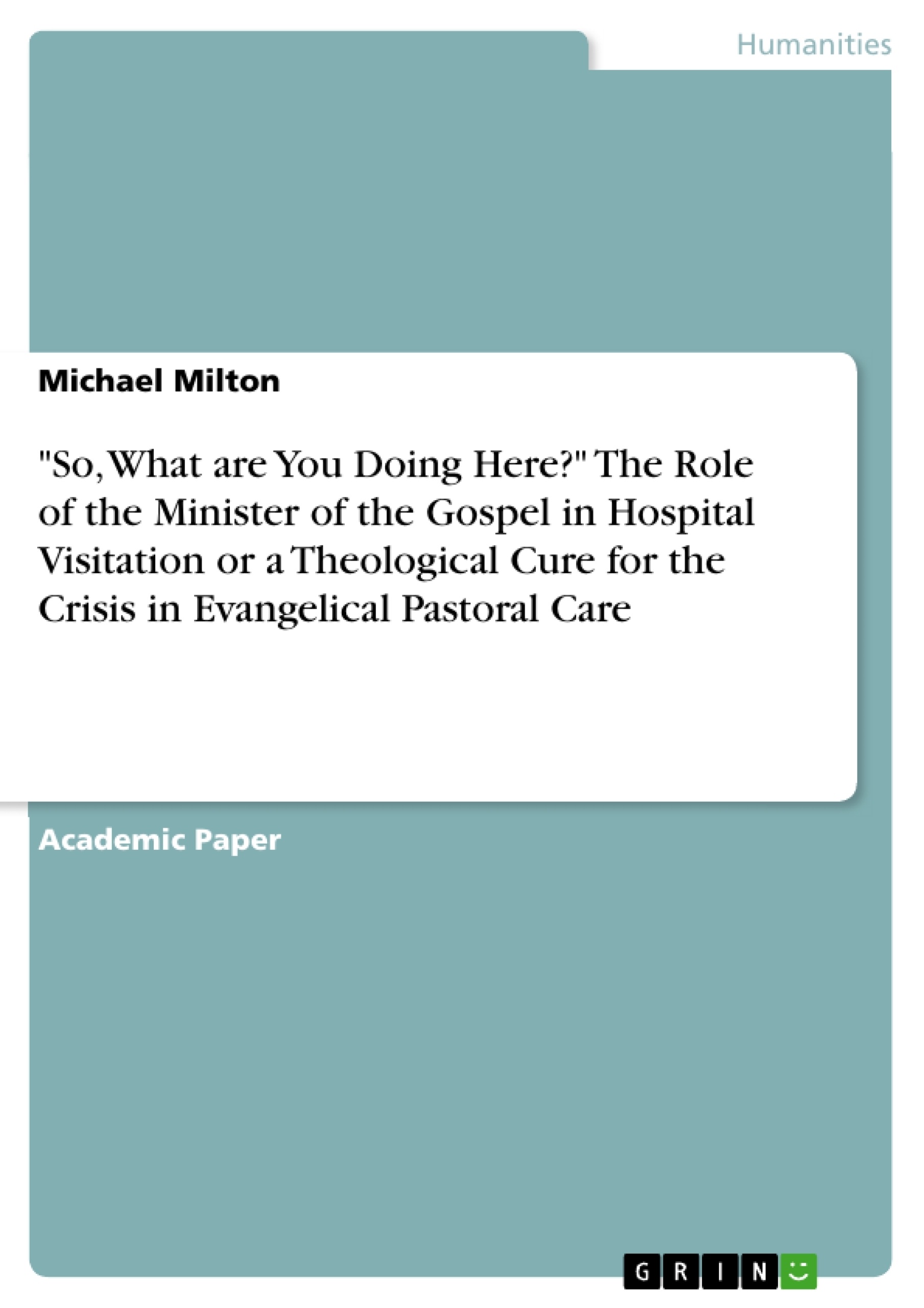This peer-reviewed journal article is revised from an academic paper delivered by the author to the 2001 Annual Meeting of the Evangelical Theological Society in Colorado Springs, Colorado, USA. The paper seeks to identify problems in pastoral visitation and pastoral care that have resulted from an overuse or over-reliance on psycho-therapeutic techniques rather than sacramental or theological resources most associated with clergy. The paper concludes that assuming "false faces" in pastoral care will not only diminish the intended spiritual care of the patient, but effectively and negatively impact the clergyman's place "at the table" with healthcare professionals.
Inhaltsverzeichnis (Table of Contents)
- I. A MODERN PARABLE OF PASTORAL VISITATION OF THE SICK
- II. MODERN PROBLEMS IN PASTORAL CARE OF THE SICK AND DYING
- 1. Liberalizing tendencies.
- 2. Ordinary but dangerous assumed identities
- a. Therapist
- b. Friend
- c. Priest
- d. Spiritual Advisor
- e. Religious Leader
- III. A THEOLOGICAL CURE FOR THE CRISIS IN EVANGELICAL PASTORAL CARE
Zielsetzung und Themenschwerpunkte (Objectives and Key Themes)
This paper aims to address the issue of the role of ministers of the gospel in hospital visitation. It seeks to re-orient future pastors toward a biblically faithful, vocationally satisfying, and historically evangelical approach to the visitation of the sick and dying.
- The importance of faithful biblical instruction in pastoral care.
- The dangers of relying on modern psychology in place of Scripture.
- The need for pastors to recognize the potential for crisis in their role in hospital visitation.
- The importance of understanding the distinct role of the minister of the gospel in hospital visitation.
- The necessity of re-orienting pastoral care towards a traditional evangelical approach.
Zusammenfassung der Kapitel (Chapter Summaries)
Chapter I presents a real-life encounter between a chaplain and a patient, highlighting the question of the chaplain's role in hospital visitation. Chapter II explores the modern problems in pastoral care of the sick and dying, including liberalizing tendencies and errant pastoral identities.
Schlüsselwörter (Keywords)
The paper focuses on pastoral care, hospital visitation, evangelical theology, liberalizing tendencies, pastoral identity, and the role of the minister of the gospel in caring for the sick and dying. It also touches upon themes of biblical faithfulness, vocational satisfaction, and historical evangelical approaches to pastoral care.
Frequently Asked Questions
What is the main crisis in evangelical pastoral care identified in this paper?
The paper identifies an over-reliance on psycho-therapeutic techniques instead of utilizing theological and sacramental resources during hospital visitations.
What are "false faces" in pastoral care?
"False faces" refer to ministers assuming roles such as therapist, friend, or generic social worker rather than their distinct identity as a minister of the gospel.
How does relying on psychology impact a pastor's role?
It can diminish the spiritual care provided to the patient and negatively affect the clergyman's professional standing among healthcare professionals.
What is the "theological cure" proposed?
The paper suggests re-orienting pastoral care toward a biblically faithful, historically evangelical approach that relies on Scripture and the distinct vocational role of the clergy.
Why is hospital visitation a distinct challenge for ministers?
Pastors often face an identity crisis in medical settings, unsure whether to act as spiritual advisors, religious leaders, or psychological counselors.
- Quote paper
- Michael Milton (Author), 2003, "So, What are You Doing Here?" The Role of the Minister of the Gospel in Hospital Visitation or a Theological Cure for the Crisis in Evangelical Pastoral Care, Munich, GRIN Verlag, https://www.grin.com/document/387358



